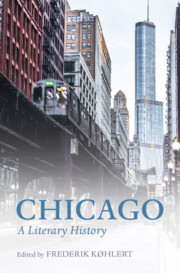Book contents
- Chicago: A Literary History
- Chicago
- Copyright page
- Contents
- Figures
- Contributors
- Acknowledgments
- Introduction: The Literary History of Chicago
- Part I The Rise of Chicago and the Literary West
- Part II Business Unusual: A New Urban American Literature
- Chapter 6 Among the Skyscrapers: Henry B. Fuller’s Chicago Novels
- Chapter 7 The Price of Success: Robert Herrick’s The Memoirs of an American Citizen and the American Business Novel
- Chapter 8 “A Story of Chicago”: The Future of Place in Frank Norris’s The Pit
- Chapter 9 Amid Forces: Theodore Dreiser’s Chicago
- Chapter 10 Eugene Field, Finley Peter Dunne, and George Ade: A New Urban Vernacular
- Part III Radicalism, Modernism, and the Chicago Renaissance
- Part IV A City of Neighborhoods: The Great Depression, Sociology, and the Black Chicago Renaissance
- Part V Traditions and Futures: Contemporary Chicago Literatures
- Selected Bibliography
- Index
Chapter 10 - Eugene Field, Finley Peter Dunne, and George Ade: A New Urban Vernacular
from Part II - Business Unusual: A New Urban American Literature
Published online by Cambridge University Press: 02 September 2021
- Chicago: A Literary History
- Chicago
- Copyright page
- Contents
- Figures
- Contributors
- Acknowledgments
- Introduction: The Literary History of Chicago
- Part I The Rise of Chicago and the Literary West
- Part II Business Unusual: A New Urban American Literature
- Chapter 6 Among the Skyscrapers: Henry B. Fuller’s Chicago Novels
- Chapter 7 The Price of Success: Robert Herrick’s The Memoirs of an American Citizen and the American Business Novel
- Chapter 8 “A Story of Chicago”: The Future of Place in Frank Norris’s The Pit
- Chapter 9 Amid Forces: Theodore Dreiser’s Chicago
- Chapter 10 Eugene Field, Finley Peter Dunne, and George Ade: A New Urban Vernacular
- Part III Radicalism, Modernism, and the Chicago Renaissance
- Part IV A City of Neighborhoods: The Great Depression, Sociology, and the Black Chicago Renaissance
- Part V Traditions and Futures: Contemporary Chicago Literatures
- Selected Bibliography
- Index
Summary
Chicago, in the late nineteenth century, gained part of its identity through the newspaper columns of Eugene Field, Finley Peter Dunne, and George Ade. They skewered the faults of what they called “Porkopolis,” yet they also depicted the city’s vitalism, brashness, and energy, and the rise of museums, the opera, and the symphony. Always, however, they returned to the common man and woman, particularly new arrivals, be they from nearby Indiana or Italy. Dunne’s literary spokesperson, the Irish bartender Mr. Dooley, held forth from his counter on Archey Road. Field, whose column “Sharps and Flats” delighted in satire, became famous as a children’s poet and playwright, while Ade’s Chicago types, such as Artie Blanchard, Pink Marsh, and Doc Horne, were praised for their ability to capture a new urban vernacular. His “Fables in Slang” earned him the title of the “American Aesop.” By holding a critical but loving mirror up to their metropolis, this trio helped forge an urban personality and a shared sense of communal pride and direction; simultaneously, they participated in the growing trend toward literary realism, local color, and the early formation of modernist prose.
- Type
- Chapter
- Information
- ChicagoA Literary History, pp. 137 - 150Publisher: Cambridge University PressPrint publication year: 2021



